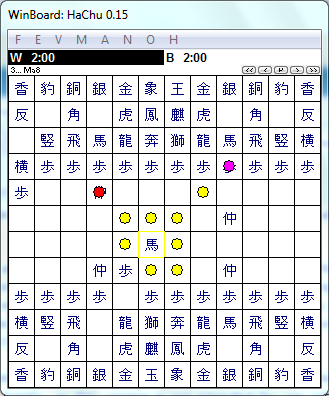
5五将棋
禽将棋
鳥将棋
和将棋 NEW -- now includes Wa Shogi
小将棋
中将棋
大将棋
Download WinBoard Shogi-Variant package (Updated May 9, 2017, see below)

|
5五将棋禽将棋鳥将棋和将棋 NEW -- now includes Wa Shogi小将棋中将棋大将棋Download WinBoard Shogi-Variant package (Updated May 9, 2017, see below) |
This package bundles the WinBoard graphical user interface for Chess-like board games with three multi-variant 'engines' (as AI plugins for WinBoard are usually called). Together these engines cover a reasonable range of Shogi variants. This includes both variants with drops (regular Shogi, Tori Shogi, Wa Shogi, Judkins Shogi and mini-Shogi), and variants without drops (Sho Shogi, Chu Shogi and Dai Shogi).
The WinBoard Alien Edition has special support for large Shogi variants, which, due to the excessively large number of required piece types, cannot be handled by the regular WinBoard or XBoard version. To solve this problem without the need to create an enormous number of piece bitmaps, (bitmaps are not scalable, so every board size would need a complete set of them), the WinBoard Alien Edition displays these extra pieces by simply writing a character (or a pair of characters, if the squares are large enough) from a kanji font on the board, and contains a list of all the Japanese names of the pieces to make that possible. (Don't forget to tick 'flip black' in the View -> Board dialog to display the opponent's pieces upside down!)
There are a few board sizes where an alternative to this 'naked kanji' representation is used. In board size 'mediocre' the kanji are written on pentagonal Shogi tiles ('koma') of various sizes. In board sizes 'tiny' and 'petite' WinBoard uses a specially developed 'mnemonic' piece representation, which displays the pieces as geometric shapes that makes it (for virtually all of them) instantly clear how they move. This makes it possible to play even games like Tai Shogi (which have hundreds of pieces) without the need to read kanji, and memorize how names relate to moves. Only pieces with exceptional moves (such as Lion or Lion Dog) have custom representations that require some learning, but even the largest Shogi variants have less than a dozen of those.
The WinBoard Alien Edition supports Wa, Chu, Dai, Tenjuku, Dai Dai, Maka Dai Dai and Tai Shogi in this way, and is completely aware of all pieces occurring in these variants (kanji names and moves), so that they can be played with legality testing on. They can be selected from the New Variant menu (chu, dai, tenjiku, dada, maka or tai), except for Wa Shogi, which has to be started by selecting the Wa engine, or dragging the file wa.ini on top of the winboard.exe icon. Not all variants have engines that can play them, however, so some of the choices are only available when you run WinBoard in 'Game Viewer' mode. When WinBoard is running with an engine, you can only select variants supported by that particular engine.
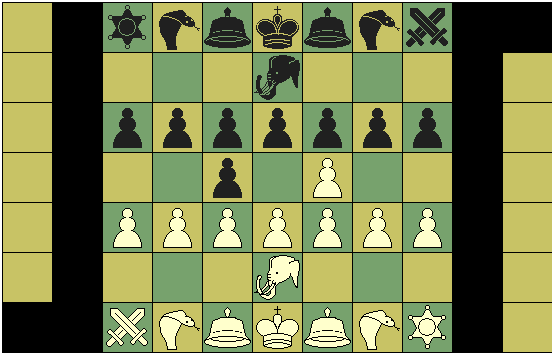
The smaller Shogi variants are supported in a different way (namely the normal way also available in the regular versions of WinBoard and XBoard). WinBoard has built-in bitmaps for the standard Shogi pieces at board size 'moderate' (kanji pieces), and board sizes 'middling' and 'bulky' (western Chess pictograms). So the representation can be chosen by changing the board size, and at some sizes you might not see some of the pieces at all, as only the pieces of western Chess have built-in bitmaps for every board size.
This version of WinBoard also has the possibility to use external, user-supplied bitmaps for the pieces. For Tori Shogi some improvised bitmaps are included for a 'bare-kanji' representation, for board size 'moderate' (58x58). It can also be played with WinBoard built-in standard pictograms (board sizes 'middling' and 'bulky'). Of course you can make your own bitmaps for other sizes and of other designs. For Shogi, where both sides use the same pieces, each piece would require two bitmaps, an 'outline' bitmap that will be drawn in its own colors, and a bitmap indicating the white background on top of which the outline will be drawn (paradoxically indicated in black). External pieces are activated by mentioning the folder they are in, with an additional -pid option ('piece-image directory').
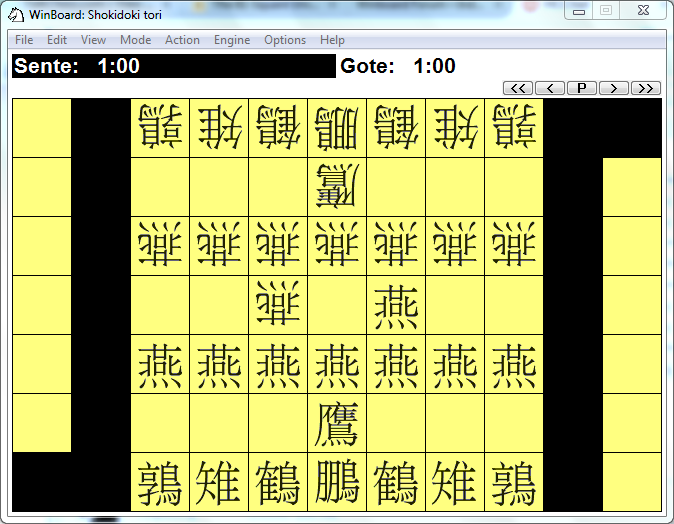
Shokidoki is an engine to play Shogi variants with drops. It was originally designed to play regular Shogi, but it was later converted to play other variants as well. And quite successfully, because it turned out to be far stronger at mini-Shogi than at regular Shogi, and belongs to the strongest programs of the World there.
The variants Judkin's Shogi (6x6) and mini-Shogi (5x5) were easily implemented, as they have identical rules and pieces to regular Shogi, and only the board size and initial setup differ. Recently Tori Shogi (7x7) was added to its capabilities, which needed a redefinition of its move-generator tables, as most pieces in Tori Shogi move very differently from there normal Shogi counterparts. Shokidoki might not be optimally tuned yet for Tori Shogi; very little information was available on the strategy for this game, and the piece values it uses are currently purely based on guess work.
As of May 13, 2015, Shokidoki also supports Euro-Shogi, an 8x8 variant designed by Max Prilin. This variant has no Lance or Silver, but each side starts with a pair of Bishops. The Knights can also make a sideway step.
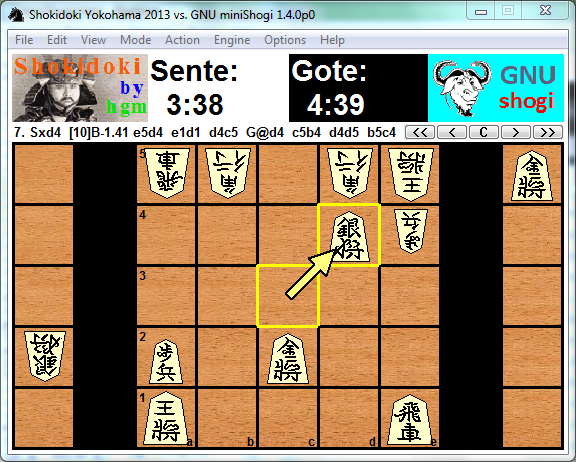
HaChu is an engine that was specifically designed for playing Chess variants on large boards. It cannot handle drops. It is still under development; one could say even in an embryonic stage. It currently can play Sho Shogi, Chu Shogi, and Dai Shogi.
HaChu is only optimized for Chu Shogi, (for which its development surged ahead compared to a more logical path), which it now plays quite well. It has been playing against human opponents on the 81dojo.com Chu-Shogi server, and is now quite hard to beat for even the strongest human Chu players there. Sho and Dai Shogi have not been separately tuned, and in fact have hardly been played at all. HaChu's ability to play those games is purely derived from that to play Chu, and it will apply a rather Chu-like strategy to them. (Which might, or might not be the proper thing to do.)
Note that HaChu also plays some non-Shogi variants, that were close enough to Shogi to not pose many problems: Makruk (Thai Chess), Shatranj (ancient Arabic/Persian Chess) and NoCastle (Chess without castling). These have not been optimized at all.
Future development of HaChu will be aiming at implementing still larger variants: Dai Dai, Maka Dai Dai, Tai and even Tenjiku Shogi. (Actually a lot of the latter already works; only the area moves are still missing.) Now that I think of it, it would be completely trivial to support Heian and Heian Dai Shogi, as these really do not contain anything new compared to Sho or Dai Shogi, and could be played in WinBoard as Sho with a different initial position, or Dai with an adapted board size (which always implies a different initial position), respectively. I don't know if there still is any interest in those games, though; they seem pretty boring.
NEW -- (May 9, 2017) The package now contains a third engine, (CrazyWa) which, like Shokidoki, handles variants with piece drops. The current version supports mini-, Judkin's, Tori, Wa and regular Shogi, and the drop variant of western Chess: Crazyhouse. Because CrazyWa has a very generic evaluation, not employing any specific Shogi knowledge, it is somewhat weaker than Shokidoki in variants they both play. Therefore the current package has installed CrazyWa only for Wa Shogi, in the selection combobox of WinBoard's startup dialog. Once WinBoard is started with CrazyWa, the other variants can be selected from the New Variant menu, though. Future versions of CrazyWa might also support Kyoto, micro- and Euro-Shogi.
The WinBoard Shogi-Variant package is easy to install. After downloading it through the link at the top of this page, just unpack it in a folder of your choice, and you are done.
To run it, browse to the folder where you unpacked it, and double-click WinBoard's black-Knight icon. This will call up WinBoard's 'Startup Dialog'. Just select the variant you want to play from the upper combobox in this dialog, and press 'OK'. If you want the computer to play against itself, you should also select the appropriate second engine (Shokidoki or CrazyWa for the drop games, HaChu for the large variants.)
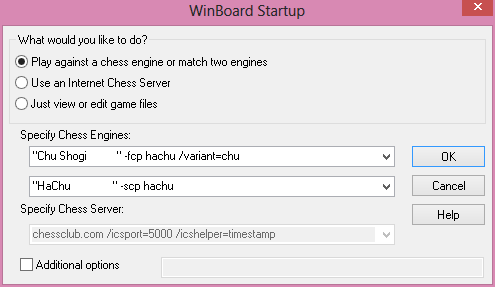
The Chess Board should now appear, and you can simply start playing (if you wanted to play Sente), or select 'Machine White' in the 'Mode' menu to let the computer start. (Note that WinBoard has the peculiarity that it always refers to the side that moves first as 'white', which breaks with Shogi tradition.) To see the computer play against itself, select Mode -> Two Machines. Note that you can change the board representation by sizing the board window.
The WinBoard Shogi-Variants package can be discussed on the WinBoard development section of the WinBoard forum. This forum is regularly visited by the developer of the WinBoard Shogi-Variants package, who posts there with username H.G.Muller. Questions and suggestions are always welcome there. Lately the 81squareuniverse forum is often off-line. As an alternative the 81Dojo forum ('Shogi in General' section) can then be used.
The package is configured to restrict the computer to play 1-min sudden-death games, but will allow the human opponent to arbitrarily exceed the alotted time. You can change the difficulty level by giving the computer more or less time, through the Options -> Time Control dialog. Less time to think makes the computer weaker. If you want to also restrict your own time, to make it more fair, you can tick the 'Auto flag' checkbox in the General Options dialog, so that you will forfeit if your clock hits zero, and select the time control you want. The computer's strength can then still be controlled through specifying a 'time odds' factor for the first engine: typing 10 there (say) will reduce the computer's time by a factor 10 compared to yours. It is not recommended to give the computer less than 10 seconds for an entire game.
May 9, 2017 - The CrazyWa engine was added to the package, installed to play Wa Shogi. WinBoard was updated. Its list of Shogi pieces was extended to include the Wa pieces. Input FENs can now contain 'dark squares' (indicated by an asterisk), to allow laying out a Wa board (which poses the unique problem it needs more holdings space then there are board ranks). Notation problems in the large variants were solved by allowing different pieces to use the same single-letter ID, and using square-coordinate disambiguation where this would cause confusion. So at least WinBoard is now able to read back the games it saved, in those variants.
May 17, 2016 - Euro-Shogi was added as new variant, through Shokidoki
July 25, 2015 - Shokidoki was updated to the version that has participated in the ICGA Computer Olympiad. Apart from beeeeing significantly stronger, mainly through statically recognizing checkmates through drop moves in quiesence search, and a more aggressive evaluation of King safety, it also fixes some bugs: